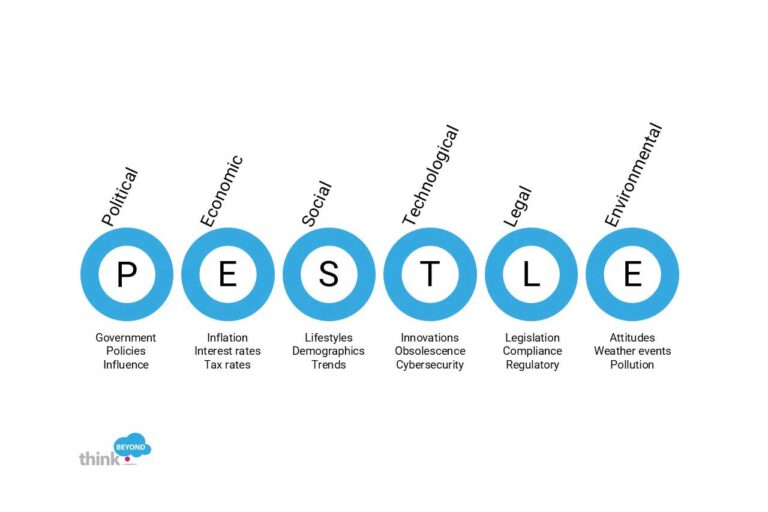On 30th October 2024, Chancellor of the Exchequer, Rachel Reeves, will outline the new Government’s tax and spending plans. The Bank of England (BoE) lowered interest rates by 0.25% to 5.0% on 1st August. The Consumer Prices Index (CPI) rose by 2.2% in the 12 months to July 2024, up from 2.0%, as of 14th August. The British Retail Consortium (BRC), claimed a non-food-led deflation of -0.3% in the first week of August versus the same period last year and a three-month average of 0% as of 27th August. The Government has also been busy shelving infrastructure projects, such as funds earmarked for re-opening local rail routes, and cancelling contracts, such as helicopter rental for ministers. So, how do you respond to these? How do you plan ahead? Today, we look at how to use PESTLE with present and future external business influences.
PESTLE analysis
Formerly known as PEST analysis, a PESTLE analysis is a tool to help organisations to understand their external influences and risks. PEST, standing for Political, Economic, Social (or Socio-cultural) and Technological, had two letters added to make PESTLE. PESTLE stands for Political, Economic, Social, Technological, Legal and Environmental factors. PESTLE helps us to formulate objectives and strategic choices that aim to guarantee the future success and survival of the organisation in the context in which it operates. Crucially, the focus of PESTLE is on external influences and risks in the environment outside of an organisation. It also goes without saying that organisations have less control over their external environment, which is continually changing. PESTLE can help organisations to adapt to changes and to retain their competitiveness.
A reminder of the meaning of PESTLE analysis:
- Political factors
- Economic factors
- Social factors
- Technological factors
- Legal factors
- Environmental factors
How to PESTLE
Political factors
Political influences might include changes of Government, tax policies, public procurement policies, business and commerce bodies, grants and incentives, international influence, stability and corruption, trade disputes and conflict.
Economic factors
Economic influences might include consumer price inflation, wage inflation, interest rates, house prices, energy prices, consumer spending, national debt, unemployment levels, Government spending, exchange rates and tax rates.
Social factors
Social influences might include demographics, fashion trends, media trends, lifestyles, wealth distribution, consumer attitudes and values, role models, buying patterns, major events and cultural movements.
Technological factors
Technological influences might include new innovations, early adoption rates, disruptive technologies, speed of obsolescence, new manufacturing techniques, cybersecurity and internet availability/speed.
Legal factors
Legal influences might include data protection legislation, company law, employment law, economic crime and anti-money laundering, health & safety, intellectual property, competition rules, regulatory bodies and industry regulations.
Environmental factors
Environmental influences might include planning restrictions, consumer attitudes, climate change, pollution and emissions rules and pricing, recycling availability, activist activities, weather and geological disruption.
Present and future PESTLE
Some businesses regularly survey their external environment. Others leave it to their annual planning cycle to give it more dedicated time and thought. As one of many tools that can be deployed, PESTLE is useful both in assessing where we are now and where we might be in future. Since a business is buffeted by external factors, like a ship on the ocean, it makes sense to be aware and alert. Just remember, Titanic was ‘unsinkable’ on its maiden voyage in 1912. The luxury super yacht, Bayesian, despite costing £30m with a reliable design and procedures to deal with a storm, sunk to the bottom of the Mediterranean on 19th August 2024. Carillion was seen as being ‘too big to fail’ when it collapsed in January 2018, leaving 450 public sector projects in limbo – with many arguing for reform of audit rules and Government procurement policies.
External business influences
Things change. Many successful enterprises have been caught out by changes in their environment. Ted Baker, the suits to evening wear retailer, closed its door for the final time on 23rd August 2024, having failed to adapt to changing consumer lifestyles*. The July collapse of Carpetright seemed on the cards given the boom-to-bust home improvement surge during the pandemic. YouGov, the market research business floated off by the UK Government, is currently worth under £600m despite being worth nearly £1.4bn before Rishi Sunak called a snap election. Rail companies delivered consistently poor performance and value in the eyes of many, leading to Labour’s announcement of eventual renationalisation. External changes are like buses. You either wait for the next one in an hour or three come along at once. The only question is whether you are prepared for it and how you will respond.
Advising on situational, competitive and strategic choices
We support and advise organisations through their strategic planning, scenario modelling and planning cycles. We also contribute to management team discussions to supply alternative points of view, insights and questions. With PESTLE just one of a multitude of tools and frameworks that we have at our disposal, we are ready to assist. Ultimately, we want to help you assure long-term future success, no matter the influences and risks. In conclusion, nobody wants to see long-established organisations in strife or in a fight for survival.
If you would like to get an alternative perspective, why not drop us a line with a short message. Alternatively, select our planning services via our webform.
Finally, why not read a related article on economic factors or our insights on new consumer trends.
* After writing, it was announced on 28th August that the sale of Ted Baker clothing online in the UK was licensed to ULAC. United Legwear and Apparel is a US-based retailer who also manage the US and Canada operations.

